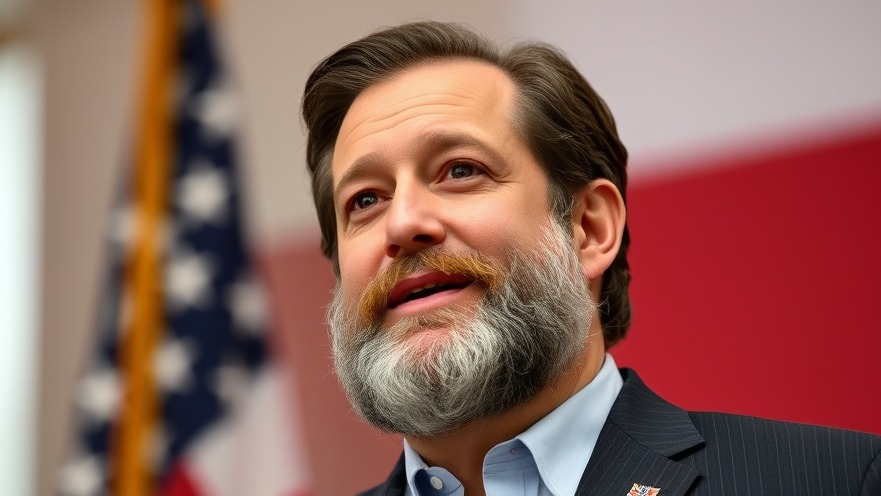
The Political Landscape: Cruz, Kimmel, and the FCC Threat
In an unprecedented twist in Texas politics, Senator Ted Cruz openly criticized the Federal Communications Commission (FCC) Chair Brendan Carr’s threat to revoke ABC's broadcast license over late-night host Jimmy Kimmel's remarks. Cruz, who typically aligns with conservative voices, described Carr's approach as "dangerous as hell," comparing it to the coercive tactics of organized crime. This unexpected stance intersects the freedoms of speech and media regulation, encapsulating a significant discussion on governmental overreach in the United States today.
Understanding the Current Context: A Call to Action?
The episode began when Kimmel's sharp monologue about the conservative activist Charlie Kirk, who was killed under controversial circumstances, caught the attention of Carr. His comments implied that Kimmel’s criticisms could warrant severe repercussions for ABC, insinuating that failure to correct conduct could lead to FCC intervention. This led to his indefinite suspension, igniting fervor among conservatives and liberals alike.
The situation exemplifies how media figures can become battlegrounds for larger political discussions. Carr claimed his intention was to ensure media outlets served the public interest, yet many view this as a thinly veiled attempt to stifle dissenting opinions. Cruz's reaction highlights the potential dangers of giving the federal government this kind of power – a sentiment echoed by many First Amendment advocates.
Free Speech: A Conservative Dilemma
Cruz’s remarks reveal a nuanced perspective within the GOP – a party traditionally advocating for minimal government intervention, grappling with how to navigate calls for accountability in media. His agreement with Kimmel’s termination for inappropriate comments starkly contrasts with his caution against federal overreach. This duality reflects a broader tension in American politics where free expression is valued but often challenged by public sentiment.
“We need to be very careful about this... because it is a slippery slope,” Cruz warned in a recent podcast episode. By invoking metaphors that liken Carr’s approach to mafia tactics, Cruz raises an alarm that many conservative pundits have ignored: the risks of inviting a heavy-handed response from government officials could backfire, especially when power shifts back to the Democratic party.
Political Forecast: What Lies Ahead?
The implications of this incident stretch beyond Kimmel and the FCC. If Carr's threats set a precedent, they could pave the way for a future where the administration can silence voices contrary to the administration’s beliefs. As Cruz predicted, should a Democrat reclaim the White House, the very tactics being employed now could be wielded against conservatives. This cyclical nature of power politics poses a critical warning and a necessity for a reevaluation of how media and government interact.
Future predictions see potential legislation aimed at redefining the boundaries of media accountability and government oversight. These developments will undoubtedly shape the next political cycle leading into the 2025 elections, as both parties gear up for a battle on social media platforms and content regulation strategies.
A Shared Responsibility?
Conversely, this incident forces conservatives to consider the media’s role in public discourse. Kimmel’s comments drew ire for their incendiary tone – what constitutes responsible journalism juxtaposed against the need for free speech? Cruz suggested that a defamation lawsuit would have been a more appropriate resolution than government intervention; however, the appetite for legal recourse has ebbed in various segments of society, revealing an unclear path forward in addressing media responsibility.
As this debate continues to unfold, with the midterm elections looming, it will be critical for all stakeholders, from citizens to legislators, to engage thoughtfully. The convergence of media, politics, and personal accountability remains a dangerous game, and understanding these nuances is key to safeguarding democratic values.
Call to Action: Engaging in the Discourse
This volatile interaction between media personalities and governmental figures underscores the importance of active engagement in political discourse. As constituents, voicing concerns about potential overreach in media regulation or supporting freedom of expression are crucial. Understanding and participating in these discussions can influence future policy directions and protect the essence of democratic debate in America.
Stay informed and engaged, as these debates shape not just Texas politics but the national landscape as well. For more insights into the current political climate, keep following Texas news and updates regarding 2025 elections and related issues.
 Add Element
Add Element  Add Row
Add Row 



Write A Comment